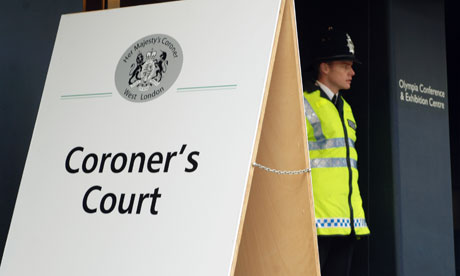I utterly welcome the appointment of His Honour Judge Peter Thornton QC (a founder and former Head of Doughty Street Chambers) to the Office of Chief Coroner. I lament that he shall not have the full powers envisaged by the reforms enacted in the Coroners and Justice Act 2009..........but judging by his 10 point plan, I am optimistic about the future. I comment on some of the points below (full speech to the Coroners' Society with full 10 points
here):
The Coroners and Justice Act 2009
I shall oversee the implementation of the relevant parts of the Coroners and Justice Act 2009. It is a pity that coroners could not have had an Act of their own (as they have had in many statutes, including those in 1843, 1844, 1860, 1887, 1926, 1955, 1980 and 1988.). But never mind. The coroner provisions of the 2009 Act (most of them at least) are expected to come into force in June 2013. Much of the Act consolidates earlier legislation. But there are a number of changes which are significant.
Coroner areas
Coroner districts will become coroner areas and the Lord Chancellor, after consultation, will be able to create larger or combined areas where appropriate. This will reduce the overall number of coroner areas, as was recommended in the Luce Review in 2003. In the short term 111 coroner areas will become 97 areas.
The reduction in 'districts' is a good idea, although why the term 'district' will be replaced by 'area' is beyond me....
Coroner nomenclature
There will be three types of coroner under the Act: senior coroner, area coroner and assistant coroner.
This is another bewildering change - basically each 'area' will have a Coroner, a Deputy and some fee-paid Assistants - as now.
Appointments, terms and conditions
From commencement of the Act new appointments of coroners, of whichever rank, will be from lawyers only (under the strict five year judicial appointment condition) and all coroners will retire at 70. These provisions do not apply to existing coroners, although it does mean, for example, that an existing doctor assistant coroner could not in future step up to be a senior or deputy coroner without the necessary legal qualification.
Thank goodness - I have never met a good Doctor Coroner - it is a judicial job for a lawyer who needs to be assisted by good medics.
Area flexibility
The Act also provides an increased flexibility as between areas, but only to a limited extent. In England all coroners will be area based (although deputies and assistants may be attached to more than one area). As now (under the transfer provisions of Section 14 of the Coroners Act 1988) a coroner may
make a request for a coroner of another area to conduct the investigation into the death. The addition to this is that the Chief Coroner will have to be notified of every request and its outcome. And in any case the Chief Coroner can require any other coroner to conduct the investigation. In other words the Chief Coroner can direct in a particular case (or even types of cases) that the investigation will be carried out by a named coroner or a coroner taken from an approved list to deal with specific types of investigation. I shall return to this topic shortly.
Another good idea - cross-border disputes between Coroners has never been edifying and it is a good idea that the Chief Coroner will be able to act as referee where necessary
In the same way, I as Chief Coroner will have the power to step in and take over an investigation at any stage. I do not intend to do that frequently, only very occasionally. And I would prefer to do it by consent. Any senior coroner should feel free to ask - there is no stigma in doing so - for assistance from
the Chief Coroner where appropriate.
Another good idea - many inquests, especially with multiple interested parties all tooled up with City lawyers and QCs have swamped some local Coroners - now they can easily call in the cavalry.
If the investigation is not completed within a year from the day on which the coroner is made aware that the body is within the coroner’s area, the coroner must notify the Chief Coroner who must keep a register of notifications. The Act does not say so, but it is implied, that the notification must include reasons why the investigation has not been completed. Unreasonable delay (and I emphasise the word ‘unreasonable’) in completing investigations is bad justice. Those of you who are timely in your work will understand that. But I remind others that unreasonable delay may be a disciplinary offence.
Excellent idea - we need start rooting out the bad apples from the Coronial jurisdiction...
Jury inquests
Is a jury required for an inquest? The simple answer is that the coroner still has a broad discretion, but more limited than before: a coroner may hold an inquest with a jury if he or she ‘thinks that there is sufficient reason for doing so’, as opposed to ‘any reason’ (the present wording). An inquest must be held with a jury in a limited number of circumstances. The main change is that there need no longer be a jury if the deceased was in custody or state detention and that death was from natural causes.
I like a good jury inquest - they are an excellent thing, especially where the Coroner has become 'too close to the case' - see an earlier post here......removing the need for a jury in natural causes in state detention cases is a good idea, so long as it is only applied in cases which really are ones of death by natural causes - I see an area ripe for litigation ......
Training
The training of coroners and coroners officers will be taken over by the Judicial College (formerly the Judicial Studies Board). I have a specific duty under the Act to make regulations about training and to make provision for the kind of training to be undertaken and the amount and frequency of training.
Please train them and make them competent - so many aren't at present....
As part of this ongoing process of legal guidance I shall also sit, as I have already been doing, in the High Court (the Administrative Court or the Divisional Court) giving decisions on claims for judicial review of coroner decisions, and giving guidance, where appropriate, on the practical application of the law.
Indeed - one judgment out already - see here - a good robust judgment which seems to suggest good things to come...
The groups could include a cadre of specially trained service death coroners who, if necessary, would travel to the area of the next of kin to investigate and hold the inquest. I shall consult, as I have already begun to, with, amongst others, the Ministry of Defence through the Defence Inquests Unit, the Royal British Legion and other service organizations and experienced coroners and local authorities who have worked in this field. Great value is placed upon expertise in this area. It is expected, and rightly expected, that bereaved families of military personnel who die on active service for their country should be afforded the greatest consideration in the investigation into every single death. I have a special duty under the Act to monitor investigations into service deaths and to ensure that coroners
conducting such investigations are suitably trained for the purpose. I intend to carry out that duty to the full.
Another brilliant idea - Coroners need to understand the particular circumstances of a Service death - particularly on operation, and show sensitivity to the difficult combat scenarios in which our brave men and women have to operate and survive in.
Another group could include coroners specializing in deaths in custody or even particular types of deaths in custody such as asphyxia from restraint.
Specialist death in custody Coroners would be personally welcomed by me with open arms - so often I have laboured in vain with Coroners who just did not understand.....
The Coroners’ Courts Support Service
Finally, I would like to be able to arrange permanent office space for two members of the very splendid Coroners’ Courts Support Service. Westminster has been very generous in the facilities provided, but at times of extreme temperature the portakabin is not exactly perfect. I have seen for myself how valuable their work is, so I shall do my best.
Get them out of those portakabins and set them to their invaluable work in the comfort they deserve...






























